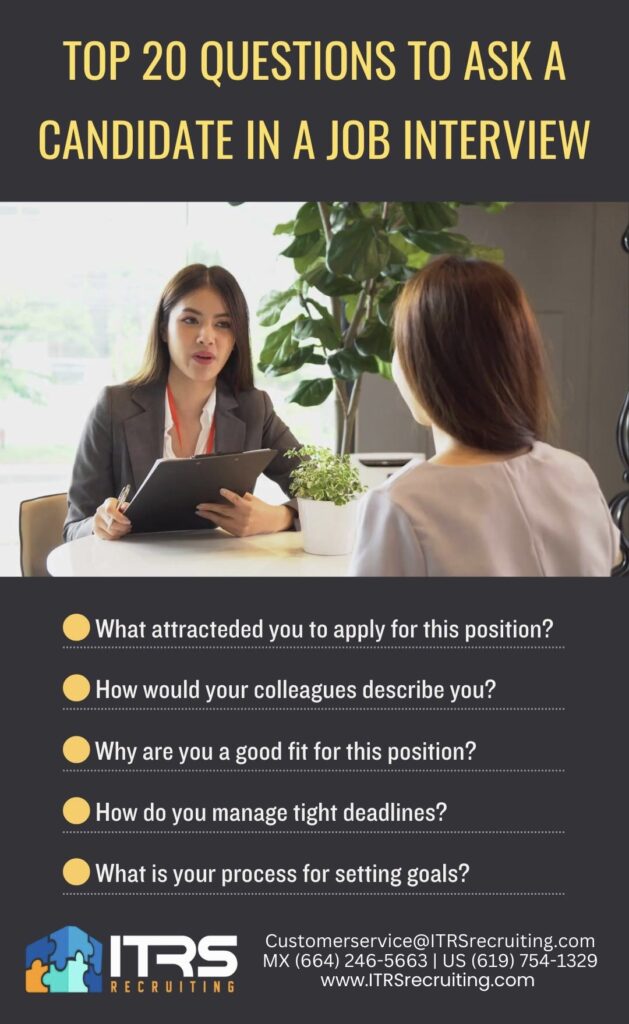TOP 20 QUESTIONS TO ASK A CANDIDATE IN A JOB INTERVIEW
When interviewing candidates for critical job positions it’s important to ask the right questions to reveal the best answers providing a more informed hiring decision.
These 20 interview questions will help the interviewer get to know a candidate better before making a decision to bring them aboard their company.
1. What attracted you to apply for this position?
By asking this question you, as the interviewer, should be able to determine if the candidate has an enthusiasm for the position or if they just applied blindly for the job.
You could also review the experience in their resume with the job opening and ask them how they would react to specific situations.
2. What steps do you take when making decisions?
This ice breaker question will give you insight into the candidate’s critical thinking skills and organizational processes they apply to decision-making situations.
Is their process well thought out and organized or is it merely done on the fly?
3. How would your colleagues describe you?
Asking this will give you a better idea of how they view themselves in the eyes of others and should give you clues on their ability to work within a team environment.
What qualities are they known for?
Make sure to develop and refer to your ideal candidate profile to see if their answer aligns with the personality traits you are looking for.
4. Name a work accomplishment that makes you proud?
This question will help you learn about the job seeker in more depth and get a better idea of the types of work they have achieved from their previous and current company.
This also gives the interviewee an opportunity to showcase some of their strongest qualities and any leadership skills they may have.
5. Why do you think you’re a good fit for this position?
This interview question will help you get a feel on if the applicants have done their research to get to know your company.
You want to be sure they’re not just randomly applying for the job to get a paycheck, only to leave for a new opportunity in a few months.
6. Tell me about your relationships with your coworkers
Personalities on teams are different. This line of interview questioning sheds light on how they interact with others and will help you determine if the interviewee has the potential to be a happy productive member of your organization.
7. How do you define hard work in the workplace?
Organizations move at different speeds from one another.
If an interviewee is comfortable working in a laidback environment where hard deadlines are rare then they may not be a good fit for a position in which they have to constantly produce work in a fast-paced deadline-driven environment.
8. Do you like working with a team or working alone?
This really depends on what position the job seekers are applying for. Is it a desk job that only requires them to be by themselves or is it work that demands coordination and communication with others?
If you conclude that the applicants are people who are flexible, willing to do multi-tasking, and wouldn’t be bothered if occasionally they work alone or with a team, these could be the best professionals to hire.
This question is more relevant now due to the current remote working environment.
9. What are some weak points you can work on?
All job applicants have weaknesses in their character or qualifications, immediately admitting them during the interview can actually be a sign of strength.
10. What are your greatest strengths to a company?
A candidate being able to talk about their strengths while maintaining their humility is a strong indicator of a winning personality.
This also gives the interviewee a chance to explain and align their strengths with the position they are interviewing for, demonstrating attributes that will contribute to the company’s goals.
11. What has been a critical work situation you solved?
It is often in the pressure-filled and stressful situations where professionals and real leaders emerge victoriously and experience their greatest growth gains.
12. Why do you plan on leaving your current employer?
Listen closely to how the candidates show their respect for their current boss and company.
Having this type of analysis will give you a better idea of how these candidates will treat their supervisors and colleagues if they are hired into your company.
13. Disclose something about yourself not on your resume
Sometimes there are qualities in a prospective employee that you simply can’t see in a resume.
They may be a good fit on paper, but when you interview them, you may get a sense from their answers that hint at possible trouble for the organization down the road.
14. How do you manage tight deadlines?
For interviewees, their most ideal answer should be a version of this: “I review a list of tasks and analyze what are the most urgent and critical matters. I put the most urgent ones on top of the list.
Next, I focus on each task with complete concentration until I finish it before moving on to the next urgent task.
15. How would your current boss describe you?
This question will hopefully give you a better idea of how the interviewee interacts with their current and past managers.
16. What is your process for setting goals?
Your best employees are generally driven and goal-oriented. This question will help ensure they have the ability to not only reach goals you would set for them but set their own goals to achieve as well.
The top candidates will be able to explain their goal-setting process in detail, how they set up their goals, break goals into smaller tasks, and measure their success once completing them.
17. What do you want to do differently at a new job?
The type of answer here will let you know their line of thinking.
Do they launch into a negative conversation about their current or former boss. Or do they look towards the future excited about the potential in your company?
18. Have you applied for any other positions?
If the interviewee has been applying for other positions, is a good idea to see what types of positions they have applied for. Are the positions similar to your opening or totally different?
If you speak to a candidate who is applying for many different types of positions in many different fields, this could be an indication that the candidate doesn’t really know what kind of job they want and are just seeing what’s out there.
19. Have you had any other interviews recently?
A great question if the interview has been going great and you want to know the type of competition your up against.
By probing for where the candidate has interviewed recently, you can establish better timeline on if you should act quickly and extend a job offer.
20. Do you have any questions for me?
If you pose this question to interviewees, the more interesting and more passionate ones will most likely have a wide variety of questions they wish to ask.
The ones who are more thoughtful and are interested in the job will be the most likely ones to ask intelligent, informative questions which will enrich the interview process.

